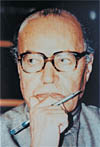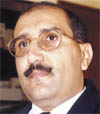The Second Biggest Project in the Middle East [Archives:2000/52/Interview]
Aden is witnessing large industrial development especially after it was declared a Free Zone. This has attracted Arab as well as foreign investors to come and invest in this beautiful historical city. Therefore, the government should make all the facilities and services needed available so that we can go ahead in our commitment to build a modern Yemen.
Radwan Al-Saqqaf of Yemen Times interviewed the investor Hamdo Abdul Karim, general manager of the Industrial Metal Company who talked about the present state of investment in Yemen and the obstacles their company faces. He said “I congratulate the Yemenis and the President and all officials in the government on this occasion of celebrating the revolution’s festivals. As an investment company in Yemen, we found that it is a nice chance to establish a project in Yemen, especially in the Free Zone.
We started working in our project in 1997 and then we started our activities a year and a half ago. We have made manufactured iron available in the Yemeni market. This is just the beginning for we are interested to build factories and stores where we are going to manufacture all kinds of iron. Our company is the first of its kind in Yemen in terms of manufacturing iron. We are employing around 200 employees including those working in this main branch in Aden and those working in our branches in Sana’a and Hodaida.
Q: What about what is said that you have the second biggest project in the Middle East?
A: We have a project on the coast of Abian in Dufas district. It is located upon 26,000 sq. m and is used for melting iron. This project is going to be established in three stages, the first stage we have started with and production will start in January 2000 and by the end of 2002 we are going to cover the needs of Yemeni market as well as measures of iron manufactured according to international standards. In addition, there will be a 40% surplus in production, which will be exported abroad. This project is considered to be one of the biggest projects in Yemen and to be the most precise in the Middle East.
The number of the employees in this project is 1700-2300. These workers will be supplied with the housing and all the services in terms of the restaurants, school, a mosque, and all the services that help the pursuits of the workers in the project. In regard to production, we are going to produce 1200 tons per day. We are exporting some of our production to Saudi Arabia, but it is not very much as we are still in the first stage. We are planning to export more as we finish establishing this project.
Q: How do you assess the investment drive in Yemen?
A: There are so many fields and business opportunities that could be better exploited by investors. We took this matter seriously and started investing in Yemen. We were encouraged much by our knowledge of the needs of the Yemeni market before we started investing in this country.
Yemen, as I said earlier, has lots of business opportunities and is a suitable and convenient place for investment, however, there are some obstacles that if are resolved, I believe investment will prosper and develop. For example, some of the obstacles we face are in regard to customs offices and taxes, and the interference of low officials in administration affairs. They tend to create some obstacles and difficulties such as assigning the taxes and customs that are not proper and correct. Besides, there are some officials who do not abide by rules. Instead they take these rules into their hands and interpret them as they like when dealing with us.
The main problem that we face is the problem of tariffs on the manufactured iron, because the law imposes the same tariff on the manufactured iron as that on the imported iron. If we refer to the customs law of manufactured iron, we find that it is not at all suitable to be applied to us. It is so because in this law the manufactured iron was limited to three or four measures and it is not at all possible to specify such measures on reality. When we opened this factory here we plan to manufacture all measures of iron and the measures pointed out by the law don’t form than 5% of our production. This restriction in this law is going to render many obstacles and difficulties for our progress. It is quite impossible to specify the measures of iron in such a manner or to say that they are six or ten measures for our production is going to be more than 100 different kinds from the different measures.
So these restrictions have to be resolved and removed. The customs laws should be made to accelerate the progress of investment and not impede it. Measures are not that important as the weights of these kinds so it is then advisable and prudent that the law is amended. When we find that there is no difference between the manufactured iron and the raw iron in terms of customs rate this will affect us much and it is a way of destroying our local industry. Such circumstances give some merchants the opportunity to compete with us and that will negatively harm us. If the situation remains as it is, I think in the course of time we will close this factory and become merchants instead of manufacturers.
Q: What are some solutions to this problem in your viewpoint?
A: The only solution I see is to review the customs and tax laws and to make a distinction between manufactured and imported iron. There should be clear description of this issue. The law should not at all restrict and limit the sizes and measurements of iron to two or three sizes or measurements. For one machine in our factory will manufacture more than 100 kinds that are made according to the most modern techniques all over the world. I wonder then whether we should import machines that only manufacture 2 or three kinds that go in harmony with the Yemeni law?!! This law is an old one and is not at all convenient for the present time which is characterized by great industrial development.
Q: Anything you would like to add?
A: I would like again to thank the President for his great commendable efforts to speed up investment in this country and I also congratulate him on the festivals of the Yemeni revolution. I also thank Yemen Times for its focus on investment especially in the Free Zone.
——
[archive-e:52-v:2000-y:2000-d:2000-12-27-p:./1999/iss52/intrview.htm]


